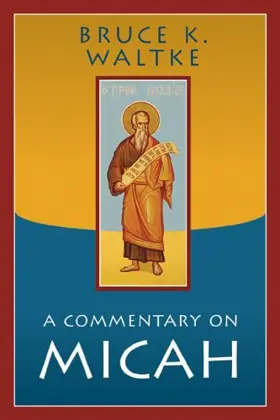

A Commentary on Micah
Pages
508
Publisher
Eerdmans
Published
7/7/2008
ISBN-13
9780802849335
In this masterful commentary, respected biblical scholar Bruce Waltke carefully interprets the message of the prophet Micah, building a bridge between Micah's ancient world and our life today.
Waltke's Commentary on Micah quickly distinguishes itself from other commentaries on this book by displaying an unprecedented exegetical thoroughness, an expert understanding of historical context, and a keen interest in illuminating the contribution of Micah to Christian theology. Tackling hard questions about date and authorship, Waltke contends that Micah himself wrote and edited the nineteen sermons comprising the book. Waltke's clear analytical outline leads readers through the three cycles of Micah, each beginning with an oracle of doom and ending with an oracle of hope, decisively showing that hope wins over doom.
Learned yet amazingly accessible, combining scholarly erudition with passion for Micah's contemporary relevance, this book will well serve teachers, pastors, and students alike.
Waltke's Commentary on Micah quickly distinguishes itself from other commentaries on this book by displaying an unprecedented exegetical thoroughness, an expert understanding of historical context, and a keen interest in illuminating the contribution of Micah to Christian theology. Tackling hard questions about date and authorship, Waltke contends that Micah himself wrote and edited the nineteen sermons comprising the book. Waltke's clear analytical outline leads readers through the three cycles of Micah, each beginning with an oracle of doom and ending with an oracle of hope, decisively showing that hope wins over doom.
Learned yet amazingly accessible, combining scholarly erudition with passion for Micah's contemporary relevance, this book will well serve teachers, pastors, and students alike.
Collections
This book appears in the following featured collections.
- Best Expositional Commentaries by Jim Rosscup
- Best Advanced OT Commentaries by Jason Gile
- Old Testament Advanced Commentaries by Moore Theological College Journal: Societas
- Basic Library Booklist by Detroit Baptist Theological Seminary
- Building an OT Commentary Library by Invitation to Biblical Interpretation (Kostenberger & Patterson)
- Top Old Testament Commentaries by Engaging Scripture (Nijay Gupta's Substack)
- TGC: Scholarly Commentaries by The Gospel Coalition
Reviews
An intensely comprehensive and delightfully insightful commentary on Micah with even greater detail than in the author’s work in either the TGC Bible Commentary or McComiskey’s The Minor Prophets. Longman extols Waltke, “He addresses both interpretation and application. He discusses all the important interpretive debates and has mastered the secondary literature. While the amount of information and the detail of his interpretation appeals mainly to professionals, the motivated layperson will also find this helpful.”
[Full Review]
Bruce Waltke has written three commentaries on the book of Micah. The first was a small commentary that appeared in the Tyndale series together with small commentaries on Obadiah and Jonah. The second was a larger and more technical commentary that appeared in the set on the Minor Prophets edited by Thomas McComiskey. This full-length commentary is one step beyond what appeared in the McComiskey volume. It is technical, and some grasp of Hebrew is recommended in order to get the full benefit of the work. There is no contemporary commentator, however, who is more well-versed in the book of Micah than Bruce Waltke. It is a must-have for serious study of the book.
[Full Review]
Grace Theological Seminary Warsaw, Indiana Waltke’s commentary on Micah is the one of the most comprehensive and in-depth works on the subject; it rivals the volume published in the Anchor Bible commentary series. Waltke’s work is much more conservative, employing a grammatico-historical method. The author seeks to determine the “book’s historical context, its text, the meaning of every word and their syntactical relationship, its figures of speech, its rhetorical techniques, and its literary forms” (x). The book is divided in two major parts: introduction and commentary. In the introduction, Waltke discusses preliminary but foundational issues such as historical background, date and authorship, form and structure, and text. Waltke points out that Micah is not identified by his family, as are other prophets, but rather by his place of origin, Moresheth Gath. Since the text is silent regarding other details about Micah, Waltke does not speculate further. The historical background of the book is comprehensively covered. The author sets the stage well by identifying moral corruption from within and the rising Neo-Assyrian Empire from without as the two volatile forces that paint the background of Micah’s ministry and message. The use of primary sources throughout the book is an asset and gives the author added credibility.
[Full Review]





